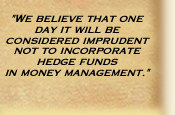July 8, 2010 – New York, NY – Hennessee Group LLC, an adviser to hedge fund investors, announced today that the Hennessee Hedge Fund Index declined –1.35% in June (+0.20% YTD), while the S&P 500 decreased –5.39% (-7.57% YTD), the Dow Jones Industrial Average declined -3.58% (-6.27%), and the NASDAQ Composite Index fell -6.55% (-7.05% YTD). Bonds advanced, as the Barclays Aggregate Bond Index increased +1.57% (+5.33% YTD), due to increases in Treasuries, Investment Grade and High Yield bonds.
“The rebound from the worst recession since the 1930’s faces added risks from Europe’s debt crisis causing managers to remain intently focused on Europe,” commented Charles Gradante, Co-Founder of Hennessee Group. “Increased bank funding stress and declining liquidity have been the main catalyst for the recent correction in global risk assets. Managers question the ability of some EU governments to bail out their banks when they are having difficulty funding sovereign debt, as credit default swaps for sovereign debt have widened at the same pace as credit default swaps for bank debt.”
“As in May, hedge funds continued to decline, amid a broad based reduction of risk and significant volatility. Hedge fund risk management performed well, with hedge funds declining only one-fourth of traditional benchmarks,” said Lee Hennessee, Managing Principal of Hennessee Group. “Managers remain cautiously positioned and expect volatility to continue. While many feel that the market could rally sharply to the upside on positive news, most remain unwilling to assume greater levels of risk in the current environment until they see stabilization.”
The Hennessee Long/Short Equity Index declined –1.70% in June (-0.14% YTD). The U.S. equity markets plunged further in June as investors continued to flee risk assets due to growing doubts regarding the ongoing European sovereign debt crisis, the strength of the global economic recovery and high unemployment domestically. Small cap stocks were hit particularly hard in June with the Russell 2000 Index down -7.9% (-2.5% YTD). While all ten S&P 500 sectors finished the month in the red, recently released economic data, particularly non-farm payrolls, suggested the economic recovery could be losing steam and weighed heavily on the more cyclical sectors; the consumer discretionary and materials sectors were the largest decliners during the month, down -9.8% and -7.1%, respectively. As was the case in May, hedge funds struggled to generate positive returns for investors due to the highly correlated, broad based sell off of risk assets during the month. That said, they still outperformed the broader indices on a relative basis. While valuations are beginning to look attractive, hedge fund managers have reduced risk and continue to emphasize capital protection due to ongoing macro issues and heightened volatility in the financial markets.
“I think managers are somewhat perplexed by the current investment environment. Many view stocks to be attractively priced with low price-to-earnings ratios. However, these PE multiples are lower than what one would expect given current interest rate. Recent earnings reports have been relatively good, and companies have provided somewhat optimistic guidance for the remainder of the year,” commented Charles Gradante. “However, on the other hand, managers are questioning what the true values of stocks are in an environment where most developed countries have insurmountable debt with a sovereign default being a real possibility and not just speculation.”
The Hennessee Arbitrage/Event Driven Index declined –0.67% in June (+3.21% YTD). Arbitrage and event driven managers experienced losses, as a flight to quality caused a re-pricing of risk assets. While funds have experienced losses in the last two months, several arbitrage strategies remain positive year-to-date. Credit markets were positive, led by a rally in Treasuries. Investment grade and high yield bonds posted positive performance on a total return basis due to a positive carry even as spreads widened. During the month, the spread on the Merrill Lynch High Yield Index widened from 598 basis points to 713 basis points during the month, the highest level since December 2009. The spread of investment-grade corporate yields increased 50 basis points, from 150 basis points to 200 basis points. The Hennessee Distressed Index fell –2.30% in June (+3.87% YTD). Distressed funds suffered in June as long portfolios experienced broad based declines. Managers have consolidated core risk positions and added protection during the sell off, but remain long biased, as is typical for the strategy. While the pace of U.S. corporate defaults has slowed dramatically in 2010, managers are optimistic on the opportunity set for new distressed opportunities over the next five years. Managers report that many companies that have refinanced debt maturities have only delayed their balance sheet problems. With a daunting maturity schedule for high yield debt and leveraged loans over the next five years, managers expect both long and short opportunities to emerge. The Hennessee Merger Arbitrage Index advanced +0.49% in June (+2.10% YTD). Despite the equity market decline and volatility, managers experienced gains as they were highly hedged and several deals approached closure. Managers are finding some attractive arbitrage opportunities in strategic acquisitions by well financed acquirers. While managers have been optimistic, we have yet to see the significant pick up of M&A activity that many expected. Most expect M&A activity to remain subdued as long as equity markets remain volatile. However, managers remain optimistic for accelerated deal activity in the future as both companies and private-equity groups are sitting on a substantial amount of dry powder, which will eventually be put to work. The Hennessee Convertible Arbitrage Index advanced +0.42% (+1.80% YTD) in June. During the month, it seemed that the selling pressure from May eased, but there was little new buying. Secondary cheapening in convertibles and a widening of credit spreads resulted in losses. Losses were offset by declining interest rates, positive cash flows, and higher volatility. The convertible space remained largely apathetic as sovereign, economic and regulatory concerns continued to weigh on investors.
“The equity and bond market in June signaled a ‘Japan like future’ for the U.S. economy, characterized by anemic GDP growth, large deficits, and benign inflation,” commented Charles Gradante. “Collectively, most hedge fund managers see better demographics for the U.S. relative to Japan, resulting in consumer demand prospects significantly better than Japan. The real debate is over when this pent-up demand will be unleashed.”
The Hennessee Global/Macro Index fell -1.10% in June (-1.93% YTD). International equities declined as the MSCI EAFE Index fell -1.16% (-14.72% YTD) during the month. As was the case in the U.S. equity markets, concerns about a global economic slowdown and sovereign debt in Europe remained the main focus for international markets. European and emerging markets held up relatively well in June, compared to the U.S. markets; however, they are down significantly more on a year-to-date basis. Hedge funds benefited from conservative portfolios, as the Hennessee International Index fell -0.80% (-0.02% YTD). The Hennessee Macro Index fell -1.60% for the month (-0.40% YTD). In recent months, macro managers have lowered risk and simplified portfolios. Many macro managers are positioned for the U.S. to enter a deflationary period, which would lead to lower stock prices. Managers suffered losses in a crowded short position in long term Treasuries, as prices rallied in a flight to quality. The 10-year Treasury yield tumbled from 3.31% to 2.95%, falling below 3% for the first time since April of 2009. Risk-averse investors continued to shift into precious metals, benefiting hedge funds, as a key macro theme has been long gold, which hit a record high in June.
For more information on hedge fund strategy performance in 2010, please see the Hennessee Hedge Fund Review, our monthly hedge fund publication, at: http://www.hennesseegroup.com/hhfr/index.html.
About the Hennessee Group LLC
Hennessee Group LLC is a Registered Investment Adviser that consults direct investors in hedge funds on asset allocation, manager selection, and ongoing monitoring of hedge fund managers. Hennessee Group LLC is not a tracker of hedge funds. The Hennessee Hedge Fund Indices® are for the sole purpose of benchmarking individual hedge fund manager performance. The Hennessee Group does not sell a hedge fund-of-funds product nor does it market individual hedge fund managers. For additional Hennessee Group Press Releases, please visit the Hennessee Group’s website. The Hennessee Group also publishes the Hennessee Hedge Fund Review monthly, which provides a comprehensive hedge fund performance review, statistics, and market analysis; all of which is value added to hedge fund managers and investors alike.
Description of Hennessee Hedge Fund Indices®
The Hennessee Hedge Fund Indices® are calculated from performance data reported to the Hennessee Group by a diversified group of over 1,000 hedge funds. The Hennessee Hedge Fund Index is an equally weighted average of the funds in the Hennessee Hedge Fund Indices®. The funds in the Hennessee Hedge Fund Index are derived from the Hennessee Group’s database of over 3,500 hedge funds and are net of fees and unaudited. Past performance is no guarantee of future returns. ALL RIGHTS RESERVED. This material is for general information only and is not an offer or solicitation to buy or sell any security including any interest in a hedge fund.












